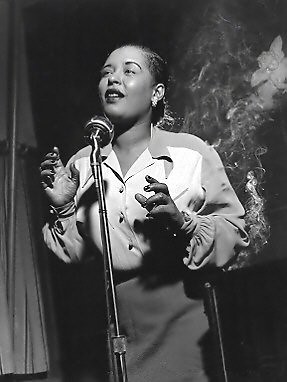A little moonlight
Leave town for four days and everything goes to hell at home and work. I'll be picking up the pieces over the next few days, so bear with me. And the next two months will also be rocky as I prepare to move. Just thinking about it gives me heart palpatations . . .
But enough about my petty concerns, let's talk about a woman who had real problems. You don't have to have read or seen Lady Sings The Blues (though both the book and film are worth your time) to be familiar with the Billie Holiday mythology: Although her childhood was unpromising--she was abandoned by her father, neglected by her mother and arrested for prostitution while still a teenager--Holiday found salvation through her voice. Gigs in small Harlem clubs led to her being "discovered" by producer John Hammond in 1933. Soon, she was recording with Benny Goodman, Teddy Wilson and Lester Young and she later performed with such luminaries as Count Basie and Louis Armstrong. By the time she died in 1959, Holiday was America's preeminent female jazz singer--despite having a range of only a little more than an octave. Like so many great musicians, she had a weakness for heroin and booze, which led to several arrests and a jail stint and sent her to an early grave at 44 from cirrhosis of the liver.

Liner notes by Ashley Kahn that accompany the excellent Billie Holiday box set The Ultimate Collection describe the uncanny power of her voice more eloquently than I ever could:
She is intimacy and isolation in a twin orbit, singing as if to everyone while sighing only to herself. She innocently pulls and plays with time as if it were salt-water taffy, starting her lines waaay behind the beat, imbuing her performance with that heavy eye-lid feel. She evokes a brooding sense of loneliness that became her currency alone.
I've always preferred the earlier Holiday recordings from the 1930s, to the later ones in which her voice sounds thick and weary. If you haven't heard the 1939 Commodore recording of "Strange Fruit"--the first and best take on her signature song--it will be a revelation. The light, tripping "What A Little Moonlight Can Do," is also early (1935). "Love Me Or Leave Me," is from Holiday's 1950s Verve period, but it's a swinging beaut.
Strange Fruit (mp3) - Billie Holiday
But enough about my petty concerns, let's talk about a woman who had real problems. You don't have to have read or seen Lady Sings The Blues (though both the book and film are worth your time) to be familiar with the Billie Holiday mythology: Although her childhood was unpromising--she was abandoned by her father, neglected by her mother and arrested for prostitution while still a teenager--Holiday found salvation through her voice. Gigs in small Harlem clubs led to her being "discovered" by producer John Hammond in 1933. Soon, she was recording with Benny Goodman, Teddy Wilson and Lester Young and she later performed with such luminaries as Count Basie and Louis Armstrong. By the time she died in 1959, Holiday was America's preeminent female jazz singer--despite having a range of only a little more than an octave. Like so many great musicians, she had a weakness for heroin and booze, which led to several arrests and a jail stint and sent her to an early grave at 44 from cirrhosis of the liver.

Liner notes by Ashley Kahn that accompany the excellent Billie Holiday box set The Ultimate Collection describe the uncanny power of her voice more eloquently than I ever could:
She is intimacy and isolation in a twin orbit, singing as if to everyone while sighing only to herself. She innocently pulls and plays with time as if it were salt-water taffy, starting her lines waaay behind the beat, imbuing her performance with that heavy eye-lid feel. She evokes a brooding sense of loneliness that became her currency alone.
I've always preferred the earlier Holiday recordings from the 1930s, to the later ones in which her voice sounds thick and weary. If you haven't heard the 1939 Commodore recording of "Strange Fruit"--the first and best take on her signature song--it will be a revelation. The light, tripping "What A Little Moonlight Can Do," is also early (1935). "Love Me Or Leave Me," is from Holiday's 1950s Verve period, but it's a swinging beaut.
Strange Fruit (mp3) - Billie Holiday
What A Little Moonlight Can Do (mp3) - Billie Holiday
Love Me or Leave Me (mp3) - Billie Holiday



1 Comments:
Thanks for sharing those songs. Here's what Studs Terkel wrote about Billie:
"It wasn't just her manner of singing. It wasn't just a vocal trick. True, her phrasing was delicate, full of subtleties and nuances. She had a way of blending a syllable, of dragging a tempo, yet always being on the beat. She developed her own unique manner of slurring the pitch, of adding new colors to the tone. Still it was more than this that gave her stature as a jazz singer. She felt every song she sang."
Post a Comment
<< Home